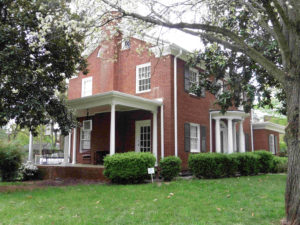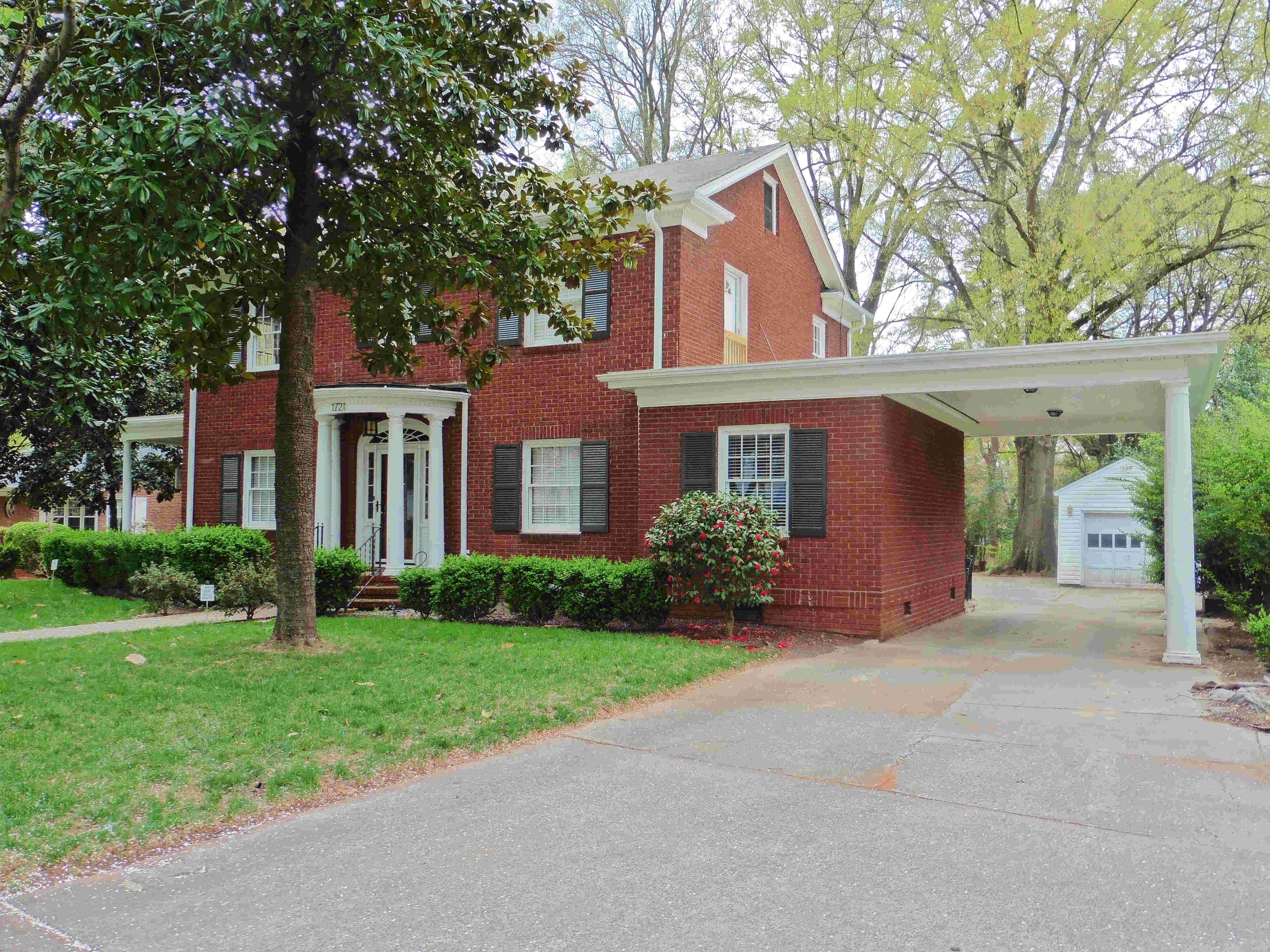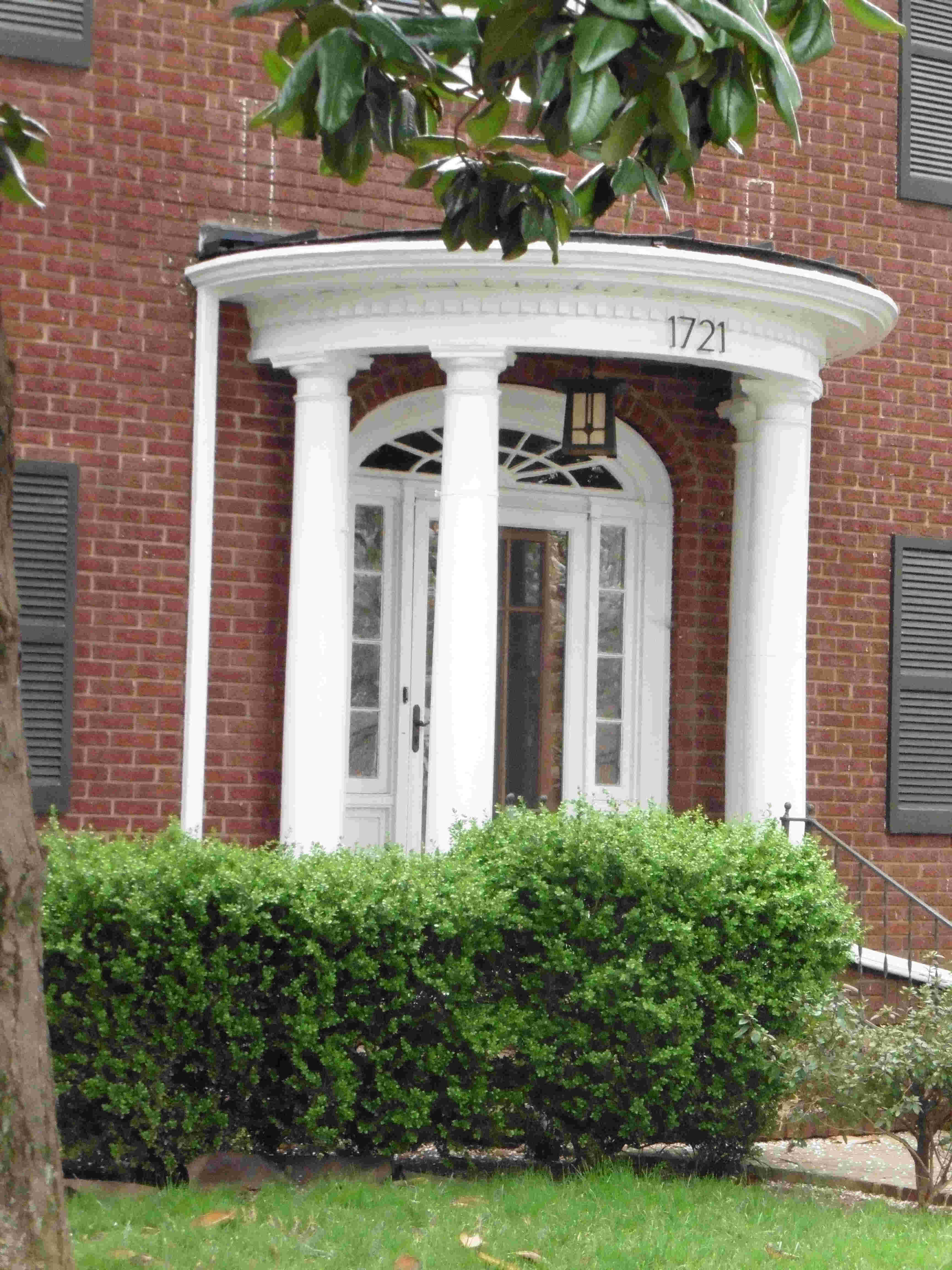1721 Oaklawn Avenue
 Built about 1950-51 for Roy S. Wynn, one of Charlotte’s leading medical men and the region’s only African American opthamologist.
Built about 1950-51 for Roy S. Wynn, one of Charlotte’s leading medical men and the region’s only African American opthamologist.
Dr. Roy Spurgeon Wynn (9.25.1900 – 8.28.1989) hailed from Bertie County in northeastern North Carolina. He won admission to Howard University in Washington, D.C., one of the nation’s most elite universities for African Americans. He graduated with a B.S. in 1929 and a M.D. in 1933. He launched his practice in Warrenton, not far from his birthplace, but soon moved to fast-growing Charlotte. He brought with him his new bride, a Warrenton girl named Maria Ellis.
When Dr. Wynn opened his Charlotte office in 1941, he initially practiced general medicine. In 1956, remembered colleague Dr. Emery Rann, “he went to Homer G.Phillips Hospital in St. Louis for specialized training in ophthalmology.” He returned to Charlotte as the city’s first black ophthalmologist — not just serving patients in need of eye care, but also publishing research such as “Retinoblastoma: Report of a Case and Review of the Literature” in the Journal of the National Medical Association. His colleagues made him president of the Charlotte Medical Society and then of the statewide Old North State Medical Society — both created by black doctors who were barred from joining white medical organizations.
In an era when simply belonging to the NAACP risked reprisals from whites, Dr. Wynn served as president of the Civil Rights organization\’s Charlotte chapter. A 1945 issue of the NAACP\’s national magazine The Crisis carried his portrait. In 1951 he signed on as a plaintiff in the lawsuit to open to African Americans the Bonnie Brae public golf course in Revolution Park, a first step toward the desegregation of all parks and public facilities in the city. McCrorey Heights neighbor Dr. Robert Green was a fellow plaintiff and another neighbor, Thomas Wyche, was the attorney. Dr. Wynn went to court again in 1961, joining yet another McCrorey Heights resident Dr. J. Dwight Martin (1622 Van Buren) in suing the city to stop construction of Carver College. The Carver campus on Beatties Ford Road, clearly aimed at African American students, was separate and inferior to the campus of Charlotte College begun at the same time — which eventually became UNC Charlotte.
Dr. Wynn became the first African American appointed to the board of Charlotte\’s Housing Authority — an influential position since about half of the city\’s public housing residents were African American.
Dr. Wynn was active in First Baptist Church West, almost certainly one of the decision-makers who helped it move to a striking new building by architect Harvey Gantt on Oaklawn Avenue in the 1980s. He took part in the fellowship of two fraternities: the Beta Delta Chapter of Sigma Pi Phi Boule; and Omega Psi Phi, which gave him its Scroll of Honor and named him Omega of the Year.



Architecture
Colonial, two-story, in red brick. In massing, materials and details, this is McCrorey Heights’ only full-blown example of the Colonial style. It stands near the center of Oaklawn Avenue, a street known for its concentration of black doctors and Civil Rights leaders in the 1950s.
Massing is symmetrical in the Palladian manner: a large two-story center block flanked by one-story extensions.
Main block of the house has a gable roof with heavy molding in the eaves and gables, including returns. Windows are eight-over-eight double-hung sash, with flanking non-functional shutters on the front windows. The front of the house has a one-story flat-roofed half-round porch with a dentilled cornice supported by four doric columns. Under the porch is the front door, topped by a fan-light and flanked by sidelights.
On the west side of the house is an exterior chimney. Two quarter-round attic windows flank it. At ground level is a one-story flat-roofed porch supported by slender doric columns.
On the east side of the house, a flat-roofed extension covers a one-story room, possibly an office, and extends over the driveway to create a porte-cochere. The room and port-cochere may date from 1962 when the original owners took out a permit for a $4000 addition.
A clapboard-sided garage stands at the rear of the house. It may date from 1975 when the original owners took out a permit to build a garage foundation.
Oaklawn-1721-1726-permit
Date issued: February 27, 1950
Owner: Dr. Roy S. Winn (sic)
Contractor: C. L. Polk? [Roberts?]
Other permit info: private garage
Oaklawn-1721-permit-a
Date issued: March 24, 1975
Owner: Roy S. Wynn
Contractor: Crouch Brothers
Estimated cost: $500
Other permit info: foundation for garage
Oaklawn-1721-permit
Date issued: March 19, 1962
Owner: Dr. and Mrs. Roy Wynn
Contractor: Reynolds Construction Co.
Estimated cost: $4,000
Other permit info: addition
Building permit files, Robinson-Spangler Carolina Room, Charlotte Mecklenburg Library.
First appeared in city directory
1951 – Roy S. Wynn (no spouse). Physician, 422 1.2 E. 2nd.
1981 – Roy S. Wynn & Maria E.
He: Physician at 2506 Beatties Ford Rd. She: No occupation listed.
City directory collection, Robinson-Spangler Carolina Room, Charlotte Mecklenburg Library.
obituary
Resources
The Crisis, June 1945.
“Roy S. Wynn,” Charlotte Mecklenburg Story website created by the Robinson-Spangler Carolina Room of the Charlotte Mecklenburg Library. http://www.cmstory.org/content/dr-roy-s-wynn
Rann, Emery L., Jr., “The Black Physician in Charlotte (A Historical Review),” 1990, self-published manuscript in the collection of the Carolina Room, Charlotte Mecklenburg Library.
“Retinoblastoma: Report of a Case and Review of the Literature,” Journal of the National Medical Association, July 1958. On-line at: https://www.ncbi.nlm.nih.gov/pmc/articles/PMC2641456/
Wynn v Trustees of Charlotte Community College System. 122 S.E.2d 404 (N.C. 1961). On-line at: https://www.courtlistener.com/opinion/1336914/wynn-v-trustees-of-charlotte-community-college-sys/
Jess Usher, “‘The Golfers,’ African American Golfers of the North Carolina Piedmont and the Struggle for Access,” North Carolina Historical Review, April 2010, pp. 158 – 193.
“NAACP Sets Meet Sunday,” Charlotte Observer, November 26, 1955.
“Carver College Suit Goes Before Judge Sharp Today,” Charlotte Observer, May 31, 1961.
“Carver College Suit Dismissed,” Charlotte Observer, June 1, 1961.
“Negro Students Shy Away from Central Piedmont College,” Charlotte Observer, March 3, 1968.